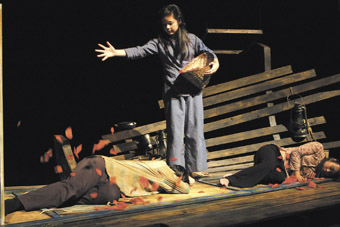the refugee’s only currency
caroline wake: powerhouse youth theatre’s mother fish

Hieu Phan, Sheena Pham and Kathy Nguyen
photo Phong Le
Hieu Phan, Sheena Pham and Kathy Nguyen
A SMALL SLICE OF VIETNAM HAS MIRACULOUSLY APPEARED IN THE MIDDLE OF PARRAMATTA OR MORE ACCURATELY AT PARRAMATTA RIVERSIDE. WE ARE STANDING OUTSIDE, WAITING FOR OUR TICKETS TO MOTHER FISH, WHILE WATCHING A FISHERMAN CAST HIS NET, A BOAT BOB IN THE WATER, CLOTHES HUNG ON WOODEN POLES, AND A CYCLIST RINSING HIS BICYCLE. WHEN WE COLLECT OUR TICKETS AND PROGRAMS WE ARE ALSO ISSUED WITH A SHEET OF RED PAPER AND SOME INSTRUCTIONS FOR FOLDING IT INTO A BOAT, WHICH PROVES SURPRISINGLY COMPLICATED. ONCE YOU HAVE COMPLETED YOUR BOAT, YOU ARE SUPPOSED TO PLACE IT ON THE RIVER BUT MOST PEOPLE HANG BACK, PREFERRING TO LOOK AT THE PANORAMA BELOW. THE SPELL IS FINALLY BROKEN WHEN THE BOAT IN THE RIVER PADDLES OFF AND THE CYCLIST COMES RACING UP THE FOOTPATH, SHOUTING, “COME ON GUYS, WE HAVE TO GET INSIDE!” SINCE IT’S A FULL HOUSE THIS TAKES A WHILE, BUT THE MOVEMENT FROM THE WIDE OUTDOORS TO THE CRAMPED INDOOR SPACE OF THE THEATRE IS SUGGESTIVE OF THE JOURNEY TO COME.
On stage there is a rusty replica of a fishing boat, the wooden boards serving as both deck and hull, depending on which way the actors emerge from the trapdoor in the floor. It is here that the four characters—two sisters, Hanh and Kim, their uncle, and a young fisherman Chau—will spend the duration of the show. Younger sister Hanh is less than impressed at having to travel with her irascible uncle, who, for his part, is none too pleased about having two teenaged girls in tow. In anticipation of the move to America (no one is aiming for Australia), Uncle has converted to Christianity but he is ecumenical enough to instruct the girls, “You pray to Buddha, I pray to Jesus, that way everyone will look out for us.” In another exchange, Chau confides that he used to have a girlfriend, causing Kim to exclaim, “Don’t tell me something happened to her?!” “Yeah, it did”, he deadpans, “She got engaged.” It is moments such as these that make the opening scenes surprisingly funny and the humour works to establish an easy rapport not only between the characters but also between characters and spectators.
Inevitably though the humour fades and as the story goes on, it starts to wear. We long for some progress or failing that, some diversion, relief or catharsis. But perhaps this is precisely the point: boat journeys are long, arduous, relentless and boring. Indeed, the narrative structure is typical of what theatre theorist Freddie Rokem has called “narratives of terror” [“Narratives of Armed Conflict and Terrorism in the Theatre,” Theatre Journal, Vol 54, No 54, 2002]. He argues that while conventional narratives obey an ‘if…then’ principle (if this happens, then that will follow), narratives of terror obey the principle of “then…then.” In other words, when narrating terror there can be no easy exposition, complication and resolution; only an endless series of ‘thens.’ Thus the fragile Mother Fish and her crew are subjected to a succession of unspeakable ‘thens.’ First pirates attack them, stealing from one sister and raping another. Then the boat reaches the coast of Thailand, where they are refused entry and returned to sea. Then Chau grows increasingly desperate and confused, diving off in pursuit of another passing boat. Then Hanh gets increasingly ill, eventually dying. Then, then, then: each event is unbearable in itself but in combination the events are almost too much.
There have been many plays by and about refugees in recent years but Mother Fish stands out for several reasons, not least because it deals with earlier instances of forced migration. It is also rare because it has two young girls at the centre of the story, one of whom does not survive (another rare feature in a genre that for obvious reasons tends to emphasise endurance). Finally, the play is also unusual because it focuses solely on the journey rather than making the journey a mere turning point; there isn’t a great deal of detail about life beforehand in Vietnam and there is absolutely no detail about life afterwards in Australia. In fact, the play finishes with the two surviving characters stepping onto the shore.
Landing on the shores of Parramatta Riverside, Mother Fish comes at an interesting point in Australian politics and Australian theatre. With the election of the Rudd government, some of the harshest migration laws have been repealed (TPVs have been abolished, the ‘Pacific Solution’ abandoned and the Ministerial right to review is itself under review). Similarly, the wave of theatre that developed in response to this punitive refugee policy, much of which has been reviewed in RealTime, is also receding. What Mother Fish does is to remind us that while the excesses of the Howard years may have passed (remembering always that it was a Labor government that introduced mandatory detention), the dangers of forced migration do not go away. Refugees take enormous risks when they set sail in vessels that aren’t much sturdier than paper boats and when they arrive they often have little more than their stories. For this reason, stories sometimes become the only currency refugees have, especially when dealing with immigration officials but also when dealing with well-meaning but ignorant locals. These tales, then, are precious cargo, for they have purchased freedom. Mother Fish delivers them with great humour, courage and care.
Powerhouse Youth Theatre, Mother Fish, writer, director Khoa Do, assistant director Jason McGoldrick, performers Kathy Nguyen, Sheena Pham, Hieu Phan, Vico Thai, design Kate Shanahan, composer Alan John, dramaturg Claudia Chidiac, lighting Chris Clough; Riverside Parramatta, May 24-25, www.motherfish.com.au
RealTime issue #86 Aug-Sept 2008 pg. 10






